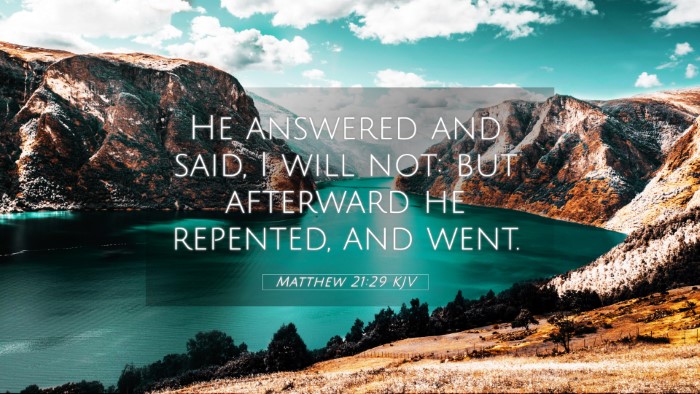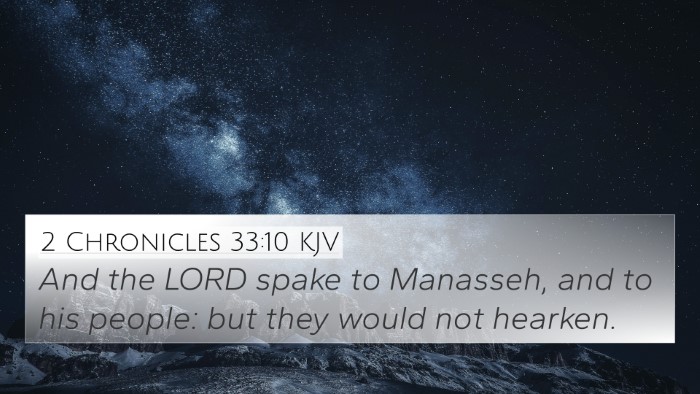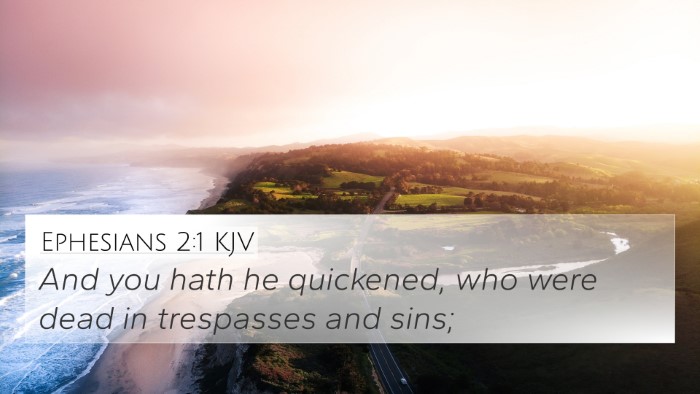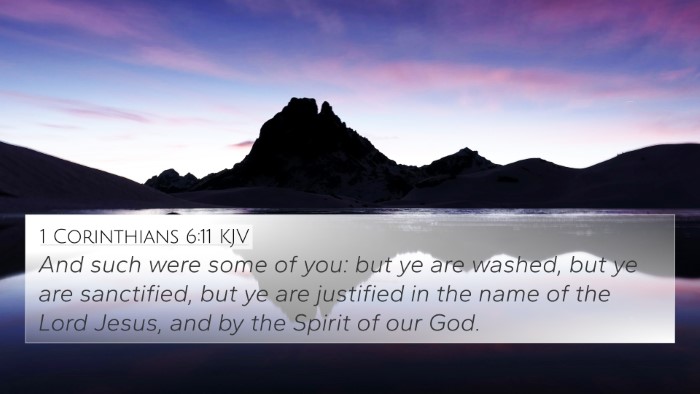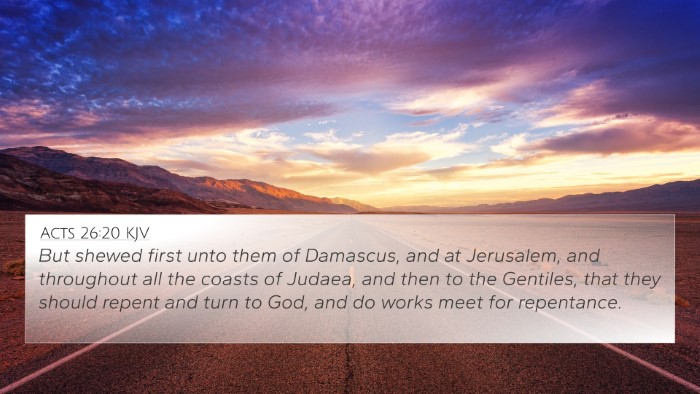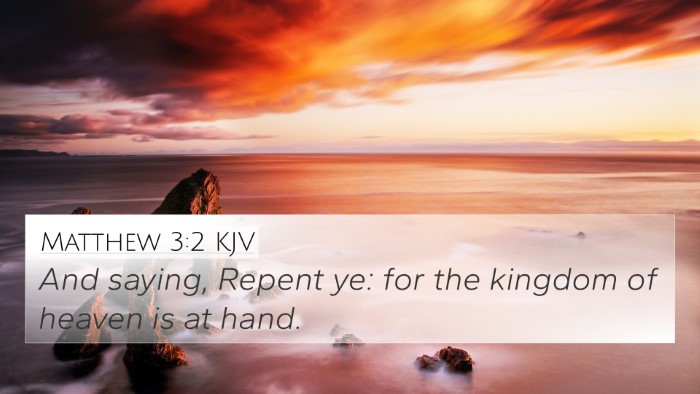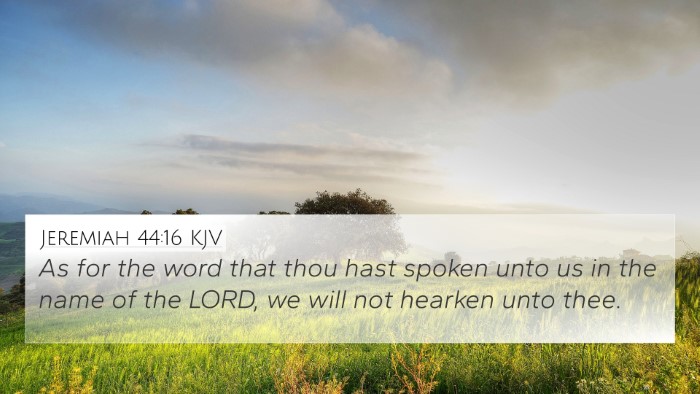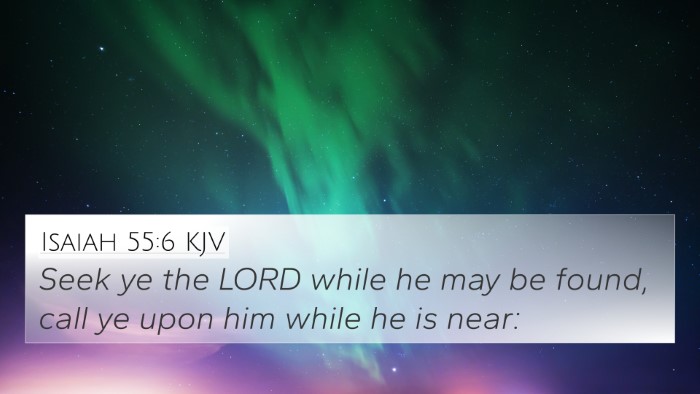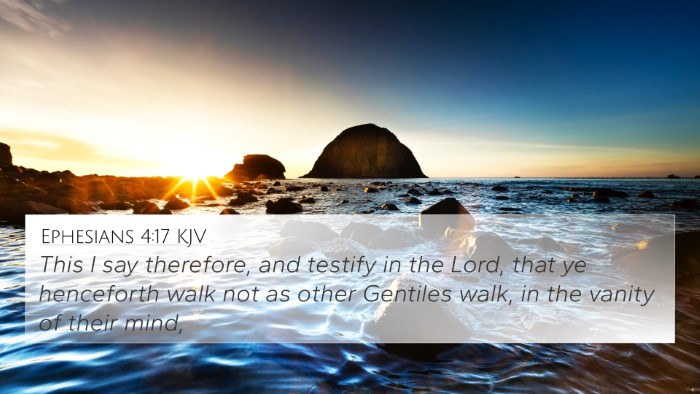Understanding Matthew 21:29
Matthew 21:29 states: "He answered and said, I will not: but afterward he repented, and went." This verse is a part of the parable of the two sons, where Jesus presents a compelling narrative about obedience, repentance, and the choices we make in our spiritual journey.
Contextual Analysis
This parable is set within the broader context of Jesus' teachings in Jerusalem, where He is addressing a crowd that includes religious leaders. The story illustrates deeper theological truths about the nature of repentance and obedience by contrasting the actions of the two sons.
Interpretations from Commentators
Matthew Henry emphasizes that the son's initial refusal signifies many people's obstinate hearts when first invited to follow Christ. However, this parable serves as a reminder that true repentance can lead to a change of heart and action.
Albert Barnes notes the significance of the son’s eventual decision to obey his father. He argues that genuine repentance is evidenced not merely by words but by actions that follow. Barnes highlights that the first son, by repenting and going, illustrates how actions aligned with God’s will can demonstrate true discipleship.
Adam Clarke points out the social and moral implications of the son's initial response. He discusses how the parable reflects on the nature of sin and repentance, explaining that many may initially reject God’s call but later find their way back through sincere repentance. Clarke also makes connections between this parable and various Old Testament teachings about obedience and the importance of following God's commandments.
Bible Cross-References
- Luke 15:17-19 - The parable of the Prodigal Son, illustrating repentance and return.
- John 14:15 - "If you love me, keep my commandments," emphasizing obedience to God.
- Romans 2:4 - Discussing God's kindness leading to repentance.
- James 1:22 - "Be doers of the word, and not hearers only," connecting obedience with faith in action.
- Matthew 7:21 - Where Jesus explains that not everyone who says 'Lord, Lord' will enter the kingdom of heaven, highlighting the importance of doing the will of God.
- 2 Corinthians 7:10 - When Paul speaks of godly sorrow leading to repentance and salvation.
- Acts 26:20 - Paul preaching repentance towards God and faith in Jesus Christ.
Connections Between Bible Verses
In exploring Matthew 21:29, we see thematic connections that illustrate the transformative power of repentance across the Scriptures. The narrative not only invites comparison among the Gospels but also bridges teachings found in both the Old and New Testaments.
For example, the initial refusal of the son mirrors the behavior of the Israelites in the Old Testament, who often turned away from God’s commands but were called back through prophetic voices. This pattern reinforces the notion of repentance being central to the life of faith.
Through cross-referencing Bible texts, we can develop a greater understanding of this theme of obedience and repentance. The call to obedience seen in the New Testament echoes the guidance provided in the Law of Moses, effectively creating an Inter-Biblical dialogue that encompasses the entirety of Scripture.
Thematic Bible Verse Connections
By examining Matthew 21:29 in relation to other scriptures, we can uncover profound insights:
- The concept of repentance is deeply embedded in various narratives, such as Isaiah 1:18, where God invites His people to reason together and cleanse their sins.
- In Luke 5:32, Jesus conveys that he came to call sinners to repentance, paralleling the response of the sinful son.
- Through Revelation 2:5, believers are urged to remember their first love and repent, reinforcing the call to return to faithful obedience.
Practical Application
As we reflect on Matthew 21:29, the call to action is clear: It invites each of us to consider our responses to God’s call and the life choices we make. Through the commentary insights, we are encouraged not only to acknowledge our failings but to embrace the grace offered through genuine repentance that leads to a changed life.
This verse serves as an invitation to continually engage with the Bible cross-reference system, providing tools for Bible study that shine light on the connections between different scriptural texts and enhance our understanding of God's character and His expectations of us.
Conclusion
In conclusion, Matthew 21:29 exemplifies the profound themes of repentance and obedience that resonate throughout the Bible. By examining cross-references and employing a comparative Bible verse analysis, believers can enrich their understanding of the Scriptures, gaining insight into God’s desire for a sincere heart that seeks His will even after initial reluctance.

